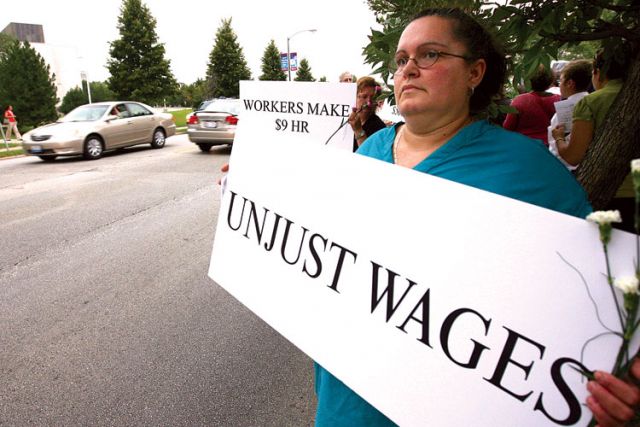The protesters rejected the new minimum wage arguing it is still 16 per cent below the poverty line. Tying the minimum to inflation merely makes a below-poverty wage permanent, they said.
“The minimum wage debate is not going to go away,” said economist Armine Yalnizyan of the Canadian Centre for Policy Alternatives.
For Catholics, the debate is a bit of deja vu all over again. The idea of a living wage, sufficient to provide for a family, can be traced back to the first social encyclical issued by Pope Leo XIII in 1891.
“There underlies a dictate of natural justice more imperious and ancient than any bargain between man and man, namely, that wages ought not to be insufficient to support a frugal and well-behaved wage-earner,” wrote Pope Leo.
Leo based his idea that wages must bear some relationship with what it costs to live a dignified if frugal existence on a concept of happiness or human flourishing that 19th-century theologians had dusted off from St. Thomas Aquinas.
It wasn’t until 1906 that Pope Leo’s “dictate of natural justice” was given a name. American moral theologian Fr. John Ryan published his doctoral dissertation under the title “A Living Wage.”
Ryan’s ideas about the just distribution of wealth and the right of workers to a just, living wage found a home north of the border in Henry Somerville’s writing. The longest serving editor of The Catholic Register published an essay on “The Living Wage and Economic Law” as early as 1914.
“The Catholic advocates the Living Wage not merely as a means of social amelioration, but as an imperative dictate of Justice,” wrote Somerville. “We, Catholics, have thus got an ethical doctrine of what wages ought to be; and, therefore, we cannot but be interested in the economic theories as to what wages must or can be.”
If in 1914 the minimum wage debate was a Catholic debate, it’s still a Catholic debate a century later as far as Citizens for Public Justice executive director Joe Gunn is concerned. “It’s really an important debate. It goes to the heart of some of the issues,” said Gunn. “What you’ve got happening in a more and more unequal society is that the minimum wage plays a key role. If we had Catholics speaking up about a living wage, I think it would help situate the debate in perhaps a deeper understanding.”
While on this side of the Atlantic Catholics were trying to nail down a living wage, Catholic thinkers in England were hopeful of a more radical refounding of the economy. The distributists, led by authors G.K. Chesterton and Hilaire Belloc, wanted an economy based on a just distribution of private property. This post-capitalist, non-socialist ideal involved a romantic revival of the medieval guild system and a kind of back- to-the-land self-reliance.
Distributists conceded that “a minimum wage is necessary as a check on capitalism’s internal logic — the drive to lower wages as much as possible in order to maximize economic returns for those who own the means of production,” said Robert Dennis, a Catholic historian and distributism expert at Queen’s University. “Distributists may not like the idea of a minimum wage, but they would be loath to concede it is necessary in a capitalist economy.”
It would be dangerous to label Pope Francis a distributist, but he has been forthright in calling for limits on the logic of capitalism.
“Today we also have to say ‘thou shalt not’ to an economy of exclusion and inequality. Such an economy kills,” Francis wrote in Evangelii Gaudium. Come June 1, Ontario’s minimum wage will still be lower than it was under Conservative Premier Bill Davis. Adjusted for inflation, the late 1970s minimum wage was $11.50.
The minimum wage is no longer something that high school kids make after school. Twenty-seven per cent of Ontario’s minimum wage workers are over 35. In 2012, 9.3 per cent of working Ontarians received the minimum wage.
There’s no Catholic number for the minimum wage, nor any magic formula for figuring out how much is enough to support human dignity. But the social doctrine of the Church does make the case that we need to try. The Compendium of the Social Doctrine of the Church insists that “The rights of workers, like all other rights, are based on the nature of the human person and on his transcendent dignity.”
Church teaching on the issue insists on both the dignity of individual workers and the good of the whole human community.
“A just wage must not be below the level of subsistence,” says the Compendium, quoting Pope Leo XIII. “The economic well-being of a country is not measured exclusively by the quantity of goods it produces but also by taking into account the manner in which they are produced and the level of equity in the distribution of income, which should allow everyone access to what is necessary for their personal development and perfection.”
That doesn’t make it easy to calculate a Catholic minimum wage, said Regis College professor of moral theology John Berkman.
“It’s an incredibly complex phenomenon. If you make the wages too out of whack you might have a massive loss of jobs,” he said. “You can’t see it as purely a kind of high- horse moral issue.”
Poverty wages are actually a drag on the economy, argues Yalnizyan. A constant churn of minimum wage workers starting and quitting dead-end jobs that don’t pay the rent and don’t have any benefits means that businesses are constantly training new people and living with the errors and poor quality associated with untrained, inexperienced staff. But what’s worse is that minimum wage workers don’t have the spending power to drive a consumer-oriented economy.


